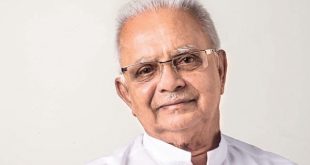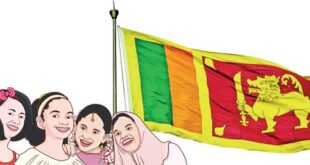Twenty years ago this month, events unbelievable were happening at an unbelievably rapid pace. As 1989 dawned, few, if any, believed that the Berlin wall that divided post-War Germany would fall. It was intended to be as solid as the Great Wall of China. Such was the animosity between the Soviet Union-led Eastern Bloc and the United States-led Western Bloc.
But this animosity lacked popular support, especially in the Eastern Bloc. Communism’s rise to power in Eastern Europe was not through popular uprisings or democratic elections. Rather it was imposed on the people by the victors of World War II — the United States, Britain, France and even the Soviet Union. After the war, the Allies decided among themselves to divide Europe, just like Britain and France divided West Asia during the First World War.
But within months after the WW II, the Allies fell out as the mutual suspicion that had shaped their relations before the war resurfaced. The crisis was aggravated when the Soviet Union cut off food supplies to Berlin in the late 1940s. The nuclear arms race and a series of hostile actions, including the U2 spy plane incident in 1960, sealed the division and eventually led to East Germany completing the Berlin wall in August 1961 on the orders of the Soviet Union. For 28 long years the wall remained under the watchful eyes of East German soldiers. Political analysts would dismiss as wishful thinking any suggestion that the wall would fall. During this period, 200 East Germans were killed while trying to cross over to the West.
Even when US President Ronald Reagan, standing on the West German side of the wall, in a 1987 historic speech, cried out, “Mr. Gorbachev {the then Soviet Union leader}, tear down this wall”, not may people thought the wall would fall.
But the political system with which Eastern Europe was being governed was rotting from within. It all began with the Solidarity Movement of Lech Walesa, the union leader who led Polish workers at the Gdansk shipyard in the mid-1980s. However, even during this period when Walesa’s strikes and protests crippled Poland, not many people foresaw the collapse of communism.
But by June that year, the writing was more or less on the wall. Even then, many sceptics argued that the Soviets would not let the Berlin wall fall. They recalled how the Soviets intervened in Hungary in 1956 and Czechoslovakia in 1968 to crush the reformist movements.
Stalinism dies
But no Soviet tanks rolled on the streets of Warsaw when the Solidarity Movement, the first independent trade union in the Soviet Bloc, grew stronger by the day. The power of the union which was secretly backed by Pope John Paul II, himself a Pole, was so strong that President Wojciech Jaruzelski was forced to hold free elections. The Solidarity Movement won the election and Walesa, a devout Catholic, became the president. Communism’s defeat in Poland fired the first cannon at the iron curtain, which had insulated the Soviet Union and its satellite states in Eastern Europe from outside influence.
An economically bankrupt Hungary followed the Polish example and adopted sweeping democratic reforms. Hungary also allowed thousands of East German tourists to cross over to the West. The events in Poland and Hungary emboldened the East Germans and the people in other Eastern European communist states such as Bulgaria, Czechoslovakia and Romania to rise. As the winds of change blew across Eastern Europe, Communism, like a house of cards, fell apart.
If the high point of this change was the collapse of the wall, the Christmas Day public execution of Romanian dictator Nicolae Ceausescu by the very people whom he ruled with an iron fist was the final blow to the Soviet Union, which itself collapsed within two years, following President Mikhail Gorbachev’s policies of glasnost (openness) and perestroika (reconstruction).
When the Berlin wall crumbled on November 9, 1989, it exposed the hollowness of Soviet imperialism and how far the Soviet Bloc had veered away from true socialism. It revealed that for Josef Stalin and his successors, socialism had been just a cover that helped them to hide their atrocities.
They had boasted that they were the champions of socialism which Karl Marx espoused and which Vladmir Lenin adopted for agricultural Russia — and its colonies. But in reality, they threw away the workers’ democracy and embarked on a project to build a super-state, a process that led to the deaths of 20 million people under Stalin’s dictatorship.
The fall of the wall by no means can be construed as a failure of socialism or the triumph of capitalism. Socialism is morally a far superior economic doctrine than capitalism, which breeds greediness. Socialism never died. What disappeared in 1991 was Stalinism, an oppressive political system which believed in the supremacy of the state power. Stalinism existed beneath a veneer of socialism. That veneer came in the form of the state-run economy.
Marx and Engels would have turned in their graves if they had lived to see Stalinism. They had rejected the concept of equating state-run economy with socialism. Engels wrote that if taking over an industry is socialism, then Napoleon and Metternich {a rightwing Austrian Prince} must be numbered among the founders of socialism.
For Marx and Engels, socialism meant emancipation of the proletariat and a more equitable distribution of wealth and resources. They argued that after the proletariat revolution, the state would wither away. But Stalin’s proletariat state did not. Even Lenin’s proletariat state showed colonial or imperialistic traits because it crushed the freedom movements in Central Asia which had been colonized by the Czar.
Instead of an authoritarian or oppressive state, Marx and Engels promoted workers’ democracy, where people would be guided by the dictum “from each according to his ability; to each according to his needs.”
Evil system
Despite socialism’s shortcomings — the main among them was the failure to take into account human greed and behaviour — it has not lost its shine. It was only months ago that socialism was being promoted as a solution when bank after bank in the United States and Europe crumbled and Iceland’s economy went bankrupt due to the economic meltdown. Many openly admitted that the crisis had its source in man’s avarice for wealth.
Stalin’s warped socialism may have killed millions but greedy capitalism is responsible for the misery that has afflicted billions of people around the world. So much so that UN figures show that hunger is the biggest killer and poverty the most widespread disease in the world.
This is no attempt to condemn market economy, which if exercised with necessary regulation is a good policy, for it recognizes the right of a human being to engage in lawful trade. In other words, it ensures economic freedom. Like every freedom has its limits, economic freedom also should have its checks and balances. But greediness knows no limit and therefore it corrupts capitalism and gives rise to an unholy nexus between the Big Business, Big Oil, Big Bank and top politicians. The nexus exists to safeguard this corrupt system and thrives in wars. If no wars, it creates wars.
In his latest movie, “Capitalism: A Love Story”, award-winning film-maker Michael Moore portrays capitalism as evil. He dismisses the idea that capitalism can be regulated. “You cannot regulate evil. You have to eliminate it and replace it with something that is good for all people and that something is democracy.”
But captains of capitalism would listen to no such advice, no matter how many economic crises hit the world economy.
 Sri lanka Muslims Web Portal Diversity and Inclusiveness
Sri lanka Muslims Web Portal Diversity and Inclusiveness



